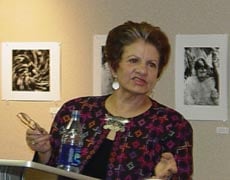The Eyewitness to the Middle East lecture series, sponsored by Friends Center, Campus Ministry, Hillel, and the Peace & Conflict Studies program took place Nov. 10 and Nov. 13.
“It was a happy coincidence that several people with expertise on the Middle East were coming to campus at the same time,” said Max Carter, Director of the Friends Center and Campus Ministry Coordinator.
The four lecturers were Rabbi Andy Koren, Director of Education for Temple Emanuel in Greensboro, Christian peacemakers Art and Peggy Gish, and Jean Zaru.
On how he chose panelists for the week, Carter said, “Part of it was happenstance of who was visiting on campus and how to orient people who are participating in next summer’s work trip to Israel and Palestine.”
Carter also said he hopes that the week inspired students to learn more about the Middle East and get involved by taking trips or supporting groups seeking peace with justice.
Rabbi Koren gave the first lecture and spoke about his visits to Israel and the tense living situations there, especially for Palestinians.
“He seemed like a friendly guy,” said first-year Jini Kades, “but he wasn’t there to talk about some of the more specific issues people were asking about.”
Some students felt there was not enough variety in the speakers’ perspectives. “A half truth is a whole lie,” said first-year Isaac Regenbogen.
Peggy Gish spoke on Nov. 11 about her trips to Iraq before, during, and after the U.S. war. She spoke of how horribly U.S. soldiers treat Iraqis. She included a story about a family she met who told her that U.S. soldiers came to their house mistakenly but still took their sons anyway.
“It’s interesting to hear a perspective of someone who’s not directly involved in conflicts,” said first-year Erin Burns.
Sophomore/junior transfer student James Barnett said, “I chose to attend because I’m interested in the work Christian peacemaker teams do and how they manage to work toward peace using nonviolent means as opposed to the means used by U.N. peacekeepers.”
Carter said, “We hoped that people would get a sense of the intensity of the issues and focus at bringing peace to the region.”
“Make informed choices and speak out,” said Peggy Gish. “Try to work at shaping what happens. Sometimes that means speaking out on behalf of people in specific countries who don’t really have a voice, like Iraq or Palestine.”
Art Gish said, “The history of sending soldiers into bad situations to make them better is not a very good history.
“We need to find nonviolent ways of dealing with the world’s problems, and we want to get students to think about different possibilities.
Categories:
Eyewitness to Middle East lectures
Dylan Grayson
•
November 21, 2003

Jean Zaru, speaker at Guilford (Megan Miller/ Guilfordian)
0
More to Discover
